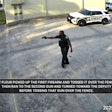Frank Fabrizio, head of special investigations for the Orange County, Fla. Sheriff’s Office, has spent years as an undercover officer and commanding SWAT teams.
“This is an officer safety issue,” says Fabrizio. He says people who get law enforcement officers’ cell phone numbers could call in the middle of a sensitive police raid or locate undercover sources and domestic-violence victims and hurt them.
But others contend the proposal goes too far.
Police officers openly list their cell phone numbers on their business cards, argues former Sen. Curt Kiser, a lobbyist for the Florida Press Association and the Florida Society of Newspaper Editors.
Kiser says information about undercover detectives is already legally protected and shielding all cell phone numbers could keep the public from finding out about a police officer who wastes tax money to make personal calls.
“I’m hopeful we’ll be able to get refinements to limit undercover activities, informants, and things like that, but a blanket exemption is too much,” says Kiser.
















